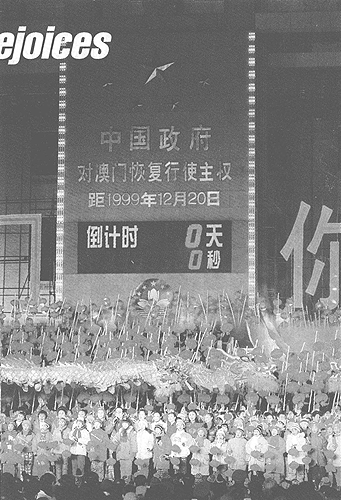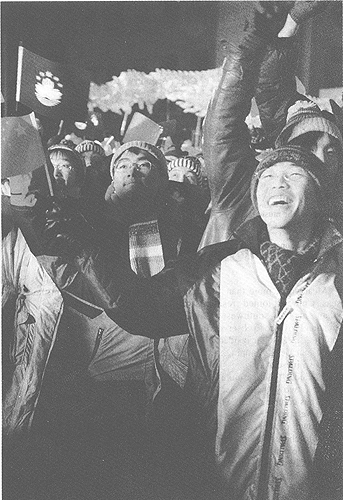|
Macao's return to the motherland is a perfect finishing touch for the end of the millennium in China. Time seems to stand still at this historic moment, but history has turned over a new page. Enveloped in immense rapture, the nation witnessed various celebrations.
Sleepless at Tian'anmen Square
Gao Yumei, a 16-year-old girl of the Yi ethnic group from south China's Yunnan Province, has never dreamed the goddess of luck would smile on her: her first trip out of the village where she has grown up is to go to Beijing and dance a dragon performance at the Tian'anmen Square for Macao's return to the motherland, a national event which would go down in the Chinese history for ever.
But it's real. On the night of December 19, Gao joined the exultant crowd at the Tian'anmen Square, which was permeated with an atmosphere of jubilation. Even braving a bone-chilling temperature of minus 16 degrees Celsius, she couldn't help showing her excitement. At 23:15, traditionally costumed Gao and her teammates commenced their dance to snake in lines across the vast square, holding high a multi-colored dragon tens of meters long.
At this time, gathered at the square were 200 color dragons and 100 lions from 12 provinces and municipalities across China. Their dances performed to the tune of the song "Flying Dragon" stirred cheers and applause time and again from the audience of 30,000, who defied the freezing weather for the grand gala.
 |
|
Once in a lifetime. Celebrations in front of the countdown clock (PI DAWEI) | In front of the giant countdown board to the east of the square, a big song-and-dance show started at 23:30 on a stage with a giant pink lotus, the emblem of the new Macao Special Administrative Region, serving as the centerpiece. Meanwhile, showers of fireworks were set off, flags and streamers held high. The 440,000-square-meter square was illuminated by floodlights, while the dark winter sky was emblazoned with brilliant displays of fireworks.
Six huge neon-lit boxes were positioned at the center of the square, flashing the Chinese characters which read "Celebrating Macao's Return to the Motherland".
Counting down in time with a giant digital clock, which has been ticking off the minutes in front of the Museum of the Chinese Revolution and the Museum of Chinese History for 594 days, the 30,000 people yelled out the seconds to the handover and erupted with applause and screams when it hit zero.
With Macao officially back in the fold of the motherland, the Chinese national anthem boomed out over the square. Two large-screen TV sets at the two sides of the main stage aired the ceremonies from Macao live, causing some people to turn misty-eyed at the sight of the five-star red national flag and the flag of the Macao Special Administrative Region rising at the venue of the handover ceremony in Macao.
 |
|
"Welcome home, Macao" (LI SHIGONG) |
Fireworks filled the sky as the joyful people were dancing and singing.
"Now, I can tell people that I am a Chinese," said Miss Ma from Macao, a postgraduate of China's prestigious Peking University. "December 20, 1999, is the proudest day of my life," she said.
He Feng, 8, is the youngest performer of 50 students from the Primary School Attached to Chinese Academy of Agriculture, who participated in the evening celebration. She said she had written to friends in Macao, and her classmates have drawn a lot of paintings with the theme of Macao's home-coming. "Teachers tell us Macao is a lost child of our motherland. When it is back, our big family is reunited," she said.
The 70-year-old Zhang Daquan, a Dongcheng District resident, said he had never imagined he could live to see the country's humiliation was washed off. "I never forget the days when foreign powers played the tyrant in northeast China.... All in all, national strength makes a difference."
Ilichev Alexander works for Russian Public TV. When busy helping filming the fireworks, he said he felt happy for the Chinese people, because it is a historic event in the Chinese history which put an end to the foreign colonial rule in China at the dawn of a new millennium.
"I am also fully confident in the future of Macao under the Chinese rule," he said.
Besides echoing the same sentiment with Ilichev, Meng Lei, a teacher with the China University of Geology who celebrated the return of Hong Kong right here two years ago, said at this very moment, he wholeheartedly admired the late Chinese leader Deng Xiaoping.
"Deng's brainchild, the 'one country, two systems' policy, has worked pretty well in the Hong Kong Special Administrative Region, which fills us full of confidence in Macao's future. Now we are waiting for Taiwan to complete China's full reunification, and I hope I will be right here at that moment."
Wrapped in layers of sweaters, Meng and his students snapped pictures of each other in front of the giant countdown clock.
Wen Lipeng is the son of the late writer Wen Yiduo, author of the well-known poem Song of Seven Sons. "The return of Macao is a joyous occasion for both the country and our family. I'm very happy that my father's long-cherished dream has at last come true. I hope my father would realize this and share our happiness in Heaven," said Wen with mixed feelings.
In his poem, Wen Yiduo compared Macao, Hong Kong and five other Chinese cities occupied by Western powers to sons compelled to leave their mother.
As people were reluctantly leaving the square in the small hours, a policeman surnamed Hou had already stood steadfast at the East Tian'anmen Subway Stop for over four hours. At zero hour, when cheers and applause spread to the subway, he consoled himself, "Anyway, I can 'hear' the historic moment." Being a policeman, Hou seldom spent holidays with his family.
"Well, finally, a big family reunion this Spring Festival."
"For you?"
"I refer to Macao." Pleasure was written all over his face.
Happiness Spread Across The Whole Nation
Elsewhere in China, cities and municipalities staged various celebrations. Evening parties and theatrical performances were held at a square by the Bund in Shanghai, along the Haihe River in Tianjin and Jialing River in Chongqing, in Dr. Sun Yat-sen's Memorial Hall Square in Guangzhou and the other cities.
The city of Zhuhai, which borders Macao, hosted a grand performance to honor Macao's return to the embrace of the motherland. The ruins of St. Paul's Cathedral, a landmark of Macao, and the statue of a fishing girl standing by the sea, a symbol of Zhuhai, characterizing the close relationship between the two cities, were projected as a setting at the backdrop of a stage.
Meanwhile, more than 100 overseas Chinese joined residents of Guang'an in southwest China's Sichuan Province to observe Macao's return at the former residence of the late leader Deng Xiaoping.
A Chinese-American surnamed Yuan said, "The formula of 'one country, two systems' set forth by Deng has contributed to world peace and development. I come to Deng's hometown on the day of Macao's return to cherish the memory of this remarkable man."
East China's Fujian Province, the principal ancestral home of the people in Macao, has seen a flurry of celebration activities in major cities which were bedecked with flowers, national flags and colorful lights.
Liu Zhenze, a man of Taiwan origin, said, "I came to Xiamen with my parents at the age of seven, but I didn't return to Taiwan to meet my loved ones until 1993. Hong Kong and Macao have now returned to the embrace of the motherland. As a senior citizen, I feel all more bitterness for being far away from home, and thirst for the day when the whole of China is reunited."
The first Chief Executive of the Macao Special Administrative Region (SAR), Edmund Ho Hau Wah, said he is confident that Macao will become a place China can be proud of after its return.
Noting that "what Hong Kong has done over the past two and a half years proves that the concept of 'one country, two systems' is correct," Tung Chee Hwa, Chief Executive of the Hong Kong SAR, said that there are reasons to believe that governing Macao by the people of Macao will surely be crowned with a complete success.
Welcome to Macao, PLA Macao Troops
At 11:00 December 20, approximately 150,000 volunteers in Zhuhai, the interior city nearest Macao, joined in a warm sendoff for officers and other ranks of the People's Liberation Army (PLA) to be stationed in Macao.
On the other side of the Gongbei Customs at the same time, more than 30,000 of Macao's 430,000 residents lined the sun-lit 10-km route from Gongbei Customs to the Macao garrison, waving the red five-star national flags of China, the SAR flags, balloons and flowers while chanting, "Welcome".
| 